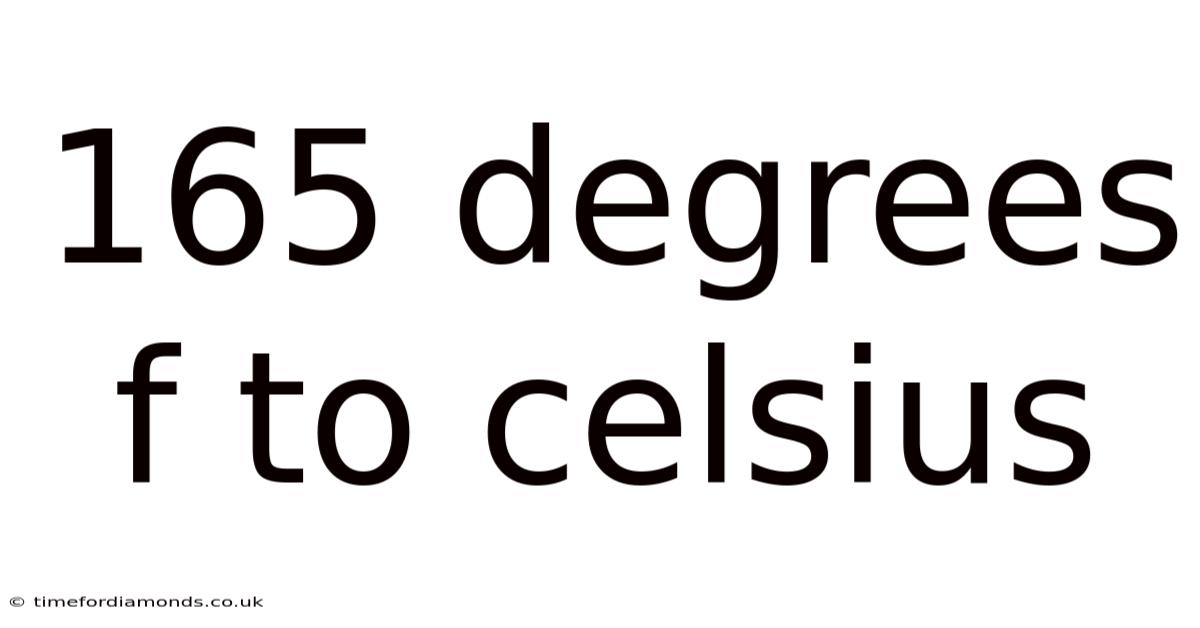165 Degrees F To Celsius
timefordiamonds
Sep 23, 2025 · 4 min read

Table of Contents
165 Degrees Fahrenheit to Celsius: A Comprehensive Guide
Converting temperatures between Fahrenheit and Celsius is a common task, especially in scientific contexts, cooking, and international communication. Understanding the process is crucial for accuracy and avoiding misunderstandings. This article will comprehensively explain how to convert 165 degrees Fahrenheit (°F) to Celsius (°C), delve into the science behind the conversion, provide practical examples, and answer frequently asked questions. We'll explore the formulas, methods, and the importance of accurate temperature conversions in various applications. By the end, you’ll be confident in converting temperatures and understanding the relationship between these two scales.
Understanding Fahrenheit and Celsius Scales
Before diving into the conversion, let's briefly revisit the two temperature scales:
-
Fahrenheit (°F): This scale, developed by Daniel Gabriel Fahrenheit in the early 18th century, sets the freezing point of water at 32°F and the boiling point at 212°F at standard atmospheric pressure.
-
Celsius (°C): Also known as the centigrade scale, Celsius was developed by Anders Celsius. It sets the freezing point of water at 0°C and the boiling point at 100°C at standard atmospheric pressure. This scale is widely used globally and preferred by the scientific community.
Converting 165°F to Celsius: The Calculation
The conversion between Fahrenheit and Celsius involves a simple, yet crucial, formula:
°C = (°F - 32) × 5/9
Let's apply this formula to convert 165°F to Celsius:
-
Subtract 32 from the Fahrenheit temperature: 165°F - 32°F = 133°F
-
Multiply the result by 5/9 (or 0.5556): 133°F × 5/9 ≈ 73.89°C
Therefore, 165°F is approximately equal to 73.89°C.
Different Methods for Conversion
While the formula above is the most common and straightforward method, there are other approaches, especially useful for mental calculations or when working without a calculator:
-
Using a Conversion Chart: Pre-made conversion charts readily available online or in scientific handbooks can provide a quick reference for common temperature conversions, including 165°F. However, for values not explicitly listed, the formula remains essential.
-
Approximation: For quick estimations, you can use the fact that a difference of 18°F is approximately equal to 10°C. This approximation, while not exact, can be useful in situations where precision isn't paramount.
Practical Applications of Temperature Conversion
Accurate temperature conversion is critical in many fields:
-
Cooking: Many recipes, especially those originating from different countries, utilize different temperature scales. Converting temperatures ensures accurate cooking results. 165°F, for example, is a crucial temperature for ensuring food is cooked safely to eliminate harmful bacteria.
-
Medicine: Precise temperature monitoring is vital in healthcare. Body temperature, medication storage, and sterilization processes all require accurate temperature conversions.
-
Science and Engineering: Scientific experiments, industrial processes, and engineering designs often involve temperature measurements and necessitate conversions between Fahrenheit and Celsius for data consistency and international collaboration.
-
Meteorology: Weather reports are frequently presented in both Fahrenheit and Celsius, requiring accurate conversion for global understanding and comparison.
The Science Behind the Conversion: Understanding the Scales
The conversion formula isn't arbitrary; it reflects the fundamental differences in the scale's construction. The Fahrenheit scale has a larger degree size than the Celsius scale. This difference necessitates the multiplication factor of 5/9 in the conversion formula. The subtraction of 32 accounts for the difference in the freezing point of water between the two scales.
Frequently Asked Questions (FAQ)
Q1: Is 165°F a high temperature?
A1: Whether 165°F is considered "high" depends entirely on the context. In cooking, it's a common temperature for ensuring food safety. However, in other applications like ambient temperature, it could be considered quite high.
Q2: Can I use an online calculator for conversion?
A2: Yes, many reliable online calculators perform Fahrenheit-to-Celsius conversions instantly and accurately. These calculators can be a convenient tool, especially for repetitive conversions.
Q3: What are some common mistakes in temperature conversion?
A3: Common mistakes include incorrectly applying the formula (forgetting to subtract 32 or using the wrong multiplication factor) and neglecting significant figures when dealing with precise measurements. Double-checking your work is crucial.
Q4: Are there other temperature scales besides Fahrenheit and Celsius?
A4: Yes, the Kelvin scale is widely used in scientific applications. It's an absolute temperature scale where 0 Kelvin represents absolute zero, the theoretical point where all molecular motion ceases.
Q5: Why is it important to use the correct temperature scale?
A5: Using the incorrect temperature scale can lead to significant errors in various applications. In cooking, it can result in undercooked or overcooked food, while in scientific experiments, it can affect the accuracy and reproducibility of results. In industrial settings, using the incorrect scale can even lead to safety hazards or equipment malfunctions.
Conclusion
Converting 165°F to Celsius is a straightforward process utilizing a well-established formula. However, understanding the underlying principles of the temperature scales and the rationale behind the conversion formula is equally important. This knowledge enhances accuracy and appreciation for the practical applications of temperature conversion across diverse fields. Remember to double-check your calculations and consider using online tools or conversion charts for efficiency, but always understand the fundamental formula to ensure accuracy and develop a solid grasp of temperature conversion concepts. Mastering this seemingly simple conversion provides a powerful tool for anyone working with temperature measurements in any field.
Latest Posts
Latest Posts
-
165cm Is How Many Feet
Sep 23, 2025
-
Convert Tbsp To Fl Oz
Sep 23, 2025
-
Convert 108 F To C
Sep 23, 2025
-
How Far Is 300 Feet
Sep 23, 2025
-
5 9 Is How Many Inches
Sep 23, 2025
Related Post
Thank you for visiting our website which covers about 165 Degrees F To Celsius . We hope the information provided has been useful to you. Feel free to contact us if you have any questions or need further assistance. See you next time and don't miss to bookmark.